八下 unit 4 Why don't you talk to your parents?单元知识点复习(共26张PPT)
文档属性
| 名称 | 八下 unit 4 Why don't you talk to your parents?单元知识点复习(共26张PPT) | 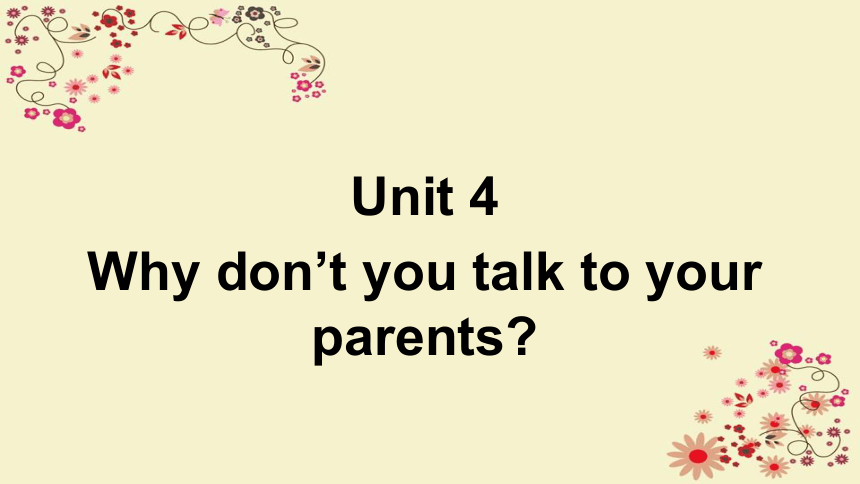 | |
| 格式 | zip | ||
| 文件大小 | 297.8KB | ||
| 资源类型 | 教案 | ||
| 版本资源 | 人教新目标(Go for it)版 | ||
| 科目 | 英语 | ||
| 更新时间 | 2023-04-07 17:11:35 | ||
图片预览

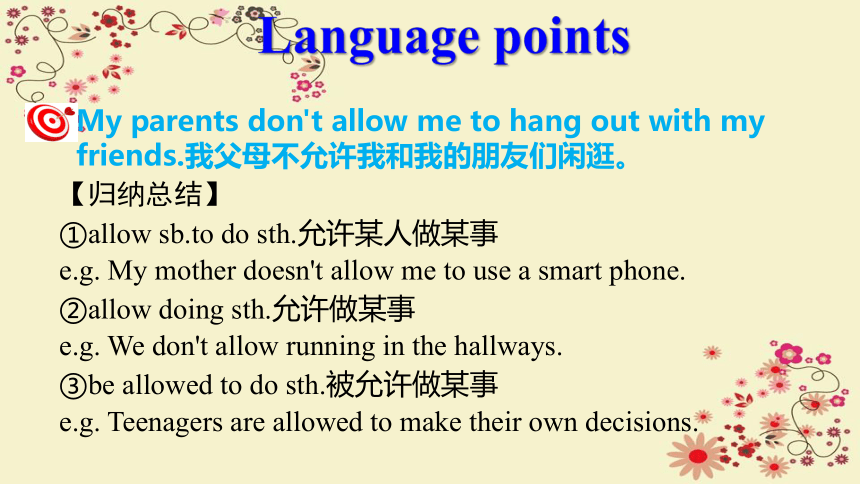

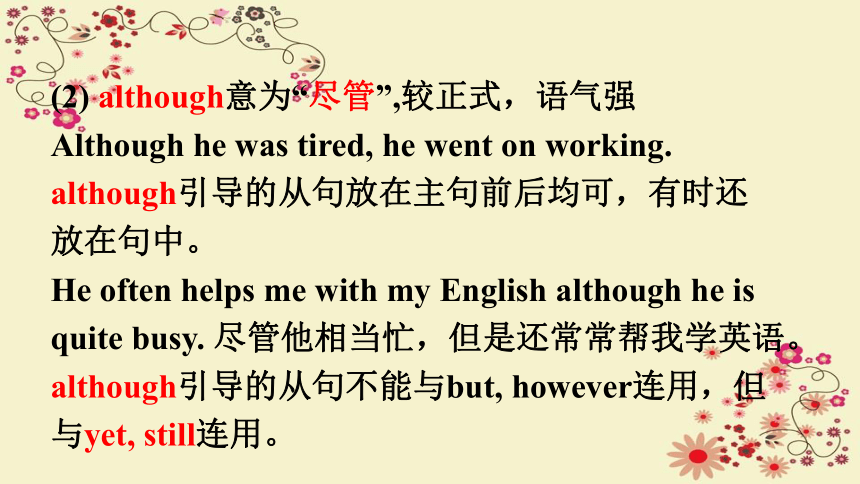

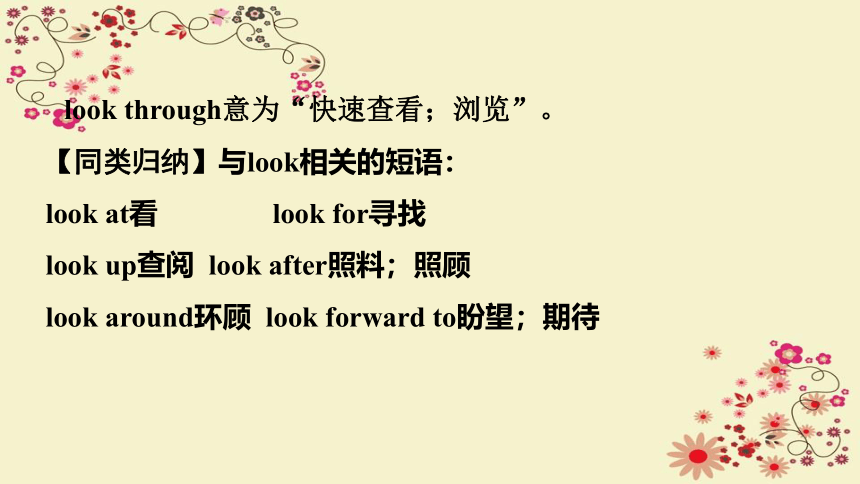

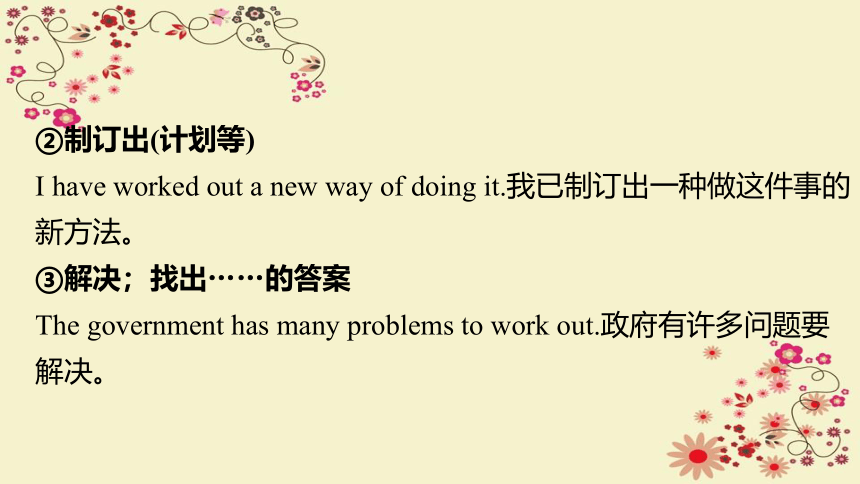

文档简介
(共26张PPT)
Unit 4
Why don’t you talk to your parents
My parents don't allow me to hang out with my friends.我父母不允许我和我的朋友们闲逛。
【归纳总结】
①allow sb.to do sth.允许某人做某事
e.g. My mother doesn't allow me to use a smart phone.
②allow doing sth.允许做某事
e.g. We don't allow running in the hallways.
③be allowed to do sth.被允许做某事
e.g. Teenagers are allowed to make their own decisions.
Language points
Although she’s wrong, it’s not a big deal.
尽管她做的不对,但没什么大不了的。
(1)big deal 是英语中 的一个固定搭配,表示“重要
的事情或是状况”多用于非正式交流,做否定用时,常说 it’s not a big deal. 或it is no big deal.
表示说话人并不认为某事有什么大不了的。
There’s a soccer game on TV this evening but I don’t have to watch it. It’s no a big deal.
(2) although意为“尽管”,较正式,语气强
Although he was tired, he went on working.
although引导的从句放在主句前后均可,有时还
放在句中。
He often helps me with my English although he is
quite busy. 尽管他相当忙,但是还常常帮我学英语。
although引导的从句不能与but, however连用,但
与yet, still连用。
Well,I found my sister looking through my things yesterday.嗯,昨天我发现我妹妹在翻看我的东西。
find sb.doing sth.意为“发现某人正在做某事”,强调动作正在进行。
【拓展延伸】
find sb.do sth.“发现某人做了某事”。有类似用法的词还有watch,see,hear等。
look through意为“快速查看;浏览”。
【同类归纳】与look相关的短语:
look at看 look for寻找
look up查阅 look after照料;照顾
look around环顾 look forward to盼望;期待
Hope things work out.希望事情会好起来。
work out意为“解决;成功地发展”。后常跟fine,well,badly等词,表明产生的结果如何。
Everything is working out well.一切都很顺利。
【拓展延伸】work out的其他用法:
①计算出(答案、数量、价格等)
The math problem is too difficult for me to work out.这道数学题对我来说太难了,我算不出。
②制订出(计划等)
I have worked out a new way of doing it.我已制订出一种做这件事的新方法。
③解决;找出……的答案
The government has many problems to work out.政府有许多问题要解决。
Instead he watches whatever he wants until late at night.
instead 用作副词,意为“代替,顶替”,单独使用时位于句首或句末。如:
没有咖啡了,改喝茶行吗?
There’s no coffee. Would you like some tea instead
instead of 是介词短语,意为“代替……”,后面可跟名词、代词、介词短语、V-ing形式等。如:
我妈妈步行去购物而不是坐公交车。
My mother went shopping on foot instead of by bus.
你为什么不参加踢足球而只是看热闹
Why don’t you play football instead of just looking on
2) until作连词,意为“直到……为止”,用于肯定句中时,表示主句的动作或状态一直持续到从句动作发生或状态出现时为止。如:
他和父母住在一起,一直到大学毕业。
He lived with his parents until he graduated from college.
我将留在这里一直到十二点钟。
I shall stay here until twelve o'clock.
If your parents are having problems,you should offer to help.如果你的父母遇到问题,你应该主动提供帮助。
offer to do sth.是固定结构,意为“主动提出做某事”。
【易混辨析】offer与provide
offer 侧重表示“主动提出;自愿给予”。 offer sb.sth.=offer sth.to sb.向某人提供某物offer to do sth.主动提出做某事
provide 指为应付意外、紧急情况等做好充分准备而“供给、提供”。 provide sb.with sth.=provide sth.for sb.给某人提供某物
Many of them are learning exam skills so that they can get into a good high school and later a good university.
so that意为“以便……,为了……”,引导目的状语从句, that从句中常使用can / may等情态动词;
so that还可以表示“因此,所以”,引导结果状语从句,在so that前可以用逗号。
And they are always comparing them with other children.
be always doing sth. 意为“总是做某事”
always与进行时连用时,常表达说话人的某
种情绪,如赞扬、不满、责备等。
他老是向父母要钱。
He was always asking his parents for money.
Maybe I could cut out a few of their activities,
but …
此处cut out 是一个短语动词,表示“删除;剪
下”或是“停止;戒除”等。再如:
Don’t cut your parents out of your lives.
不要把父母从你的生活中赶出去。
If you cut out the drinking, you’d feel much
healthier. 如果你戒酒,就会觉得身体好很多。
People shouldn’t push their kids so hard.
人们不该对自己的孩子逼得太紧。
动词push 有“推;推动”的意思, 如:
Don’t push this door, you have to pull it open.
别推这扇门,你得把它拉开才行。
本单元中,push 表示“ 使(某人)努力;鞭策;督促”,其后宾语可以是别人或自己。
The math teacher really pushes his students. That’s why they
don’t like him that much. 那位数学老师确实对学生鞭策过多了,这就是他们不那么喜欢他的原因。
And they are always comparing them with other children.而且他们总是拿自己的孩子和别的孩子相比。
compare…with…意为“把……和……比较”。强调同类相比,从而发现不同之处。
【易混辨析】compare…with…与compare…to…
compare…with… 把……和……比较 强调同类相比,从而发现不同之处。
compare…to… 把……比作…… 强调异类相比,用来说明两个事物之间的相同之处。
Dr.Alice Green says all these activities can cause a lot of stress for children.爱丽丝·格林医生说,所有这些活动会给孩子造成很大压力。
You could tell him to turn down the TV.你可以告诉他把电视音量调低。
turn down意为“关小;调低(音量)”。是由“动词+副词”构成的短语,代词作宾语时,代词必须放在turn和down之间。
【拓展延伸】
①turn down还有“拒绝”的意思。
②与turn相关的短语:
turn up调高(音量等) turn on打开(电、煤气、水等)
turn off关掉(电、煤气、水等) turn up出现
turn out产生;结果是 turn over翻阅;把……翻过来
表建议的句型
1.Why don't you do sth. = Why not do sth. 你为什么不做某事?
2.Shall we do sth. 我们做某事好吗?
3.Let's do sth. 让我们做某事吧。
4.You/We had better do sth. 你(们)/我们最好做某事。
5.You/We (not )should do sth. 你(们)/我们(不)应该做某事。
6.You/We could...你(们)/我们可以……
7.Would you like sth. / to do sth. 你想某物/做某事吗?
8.What/How about (doing) sth. (做)某事/某物怎么样?
until/although/until引导的状语从句
1. until作连词,意为“直到”,引导时间状语从句。
①主句是肯定句时,其谓语用延续性动词,强调主句的动作或状态一直持续到从句的动作发生时为止,译成“直到……为止”。
②主句是否定句时,其谓语用非延续性动词,强调主句的动作在从句的动作发生之后才开始,一般译成“直到……才……”。
2. so that意为“为了,以便”,引导目的状语从句,相当于in order that,从句中多含有can, could, may, might等情态动词。
【拓展延伸】so that还可引导结果状语从句,意为“因此;所以”,此时从句中通常不含情态动词。
3. although意为“尽管;然而”,引导让步状语从句,相当于though。
【注意】although或though不能与but用在同一个句子中,但可以与yet, still同时使用。
1. — Where are you going
— I’m going shopping.
— ___________ — Certainly.
A. Will you give me pen
B. Could you get a pen for me
C. Can I help you
D. What are you going to buy
I. 单项选择。
B
Exercises
2. John is much better than I ________.
A. to playing chess
B. for playing chess
C. at playing chess
D. in playing chess
C
3. Doing morning exercises _______ your
health.
A. is good for B. is good to
C. are good for D. are good at
4. — My spoken English is poor, what shall
I do
— Join an English language club to practice,
you’ll _________ it
A. be good at B. drop in C. deal with
A
A
5. ______ spending our vacation in a hotel, why not try hiking in the country
A. Instead of B. Because of
C. Thanks to D. As for
6.— We are free this afternoon. Let’s go to
play computer games
— Well, I think I’d better watch an English
program ___.
A. too B. either C. then D. instead
A
D
Unit 4
Why don’t you talk to your parents
My parents don't allow me to hang out with my friends.我父母不允许我和我的朋友们闲逛。
【归纳总结】
①allow sb.to do sth.允许某人做某事
e.g. My mother doesn't allow me to use a smart phone.
②allow doing sth.允许做某事
e.g. We don't allow running in the hallways.
③be allowed to do sth.被允许做某事
e.g. Teenagers are allowed to make their own decisions.
Language points
Although she’s wrong, it’s not a big deal.
尽管她做的不对,但没什么大不了的。
(1)big deal 是英语中 的一个固定搭配,表示“重要
的事情或是状况”多用于非正式交流,做否定用时,常说 it’s not a big deal. 或it is no big deal.
表示说话人并不认为某事有什么大不了的。
There’s a soccer game on TV this evening but I don’t have to watch it. It’s no a big deal.
(2) although意为“尽管”,较正式,语气强
Although he was tired, he went on working.
although引导的从句放在主句前后均可,有时还
放在句中。
He often helps me with my English although he is
quite busy. 尽管他相当忙,但是还常常帮我学英语。
although引导的从句不能与but, however连用,但
与yet, still连用。
Well,I found my sister looking through my things yesterday.嗯,昨天我发现我妹妹在翻看我的东西。
find sb.doing sth.意为“发现某人正在做某事”,强调动作正在进行。
【拓展延伸】
find sb.do sth.“发现某人做了某事”。有类似用法的词还有watch,see,hear等。
look through意为“快速查看;浏览”。
【同类归纳】与look相关的短语:
look at看 look for寻找
look up查阅 look after照料;照顾
look around环顾 look forward to盼望;期待
Hope things work out.希望事情会好起来。
work out意为“解决;成功地发展”。后常跟fine,well,badly等词,表明产生的结果如何。
Everything is working out well.一切都很顺利。
【拓展延伸】work out的其他用法:
①计算出(答案、数量、价格等)
The math problem is too difficult for me to work out.这道数学题对我来说太难了,我算不出。
②制订出(计划等)
I have worked out a new way of doing it.我已制订出一种做这件事的新方法。
③解决;找出……的答案
The government has many problems to work out.政府有许多问题要解决。
Instead he watches whatever he wants until late at night.
instead 用作副词,意为“代替,顶替”,单独使用时位于句首或句末。如:
没有咖啡了,改喝茶行吗?
There’s no coffee. Would you like some tea instead
instead of 是介词短语,意为“代替……”,后面可跟名词、代词、介词短语、V-ing形式等。如:
我妈妈步行去购物而不是坐公交车。
My mother went shopping on foot instead of by bus.
你为什么不参加踢足球而只是看热闹
Why don’t you play football instead of just looking on
2) until作连词,意为“直到……为止”,用于肯定句中时,表示主句的动作或状态一直持续到从句动作发生或状态出现时为止。如:
他和父母住在一起,一直到大学毕业。
He lived with his parents until he graduated from college.
我将留在这里一直到十二点钟。
I shall stay here until twelve o'clock.
If your parents are having problems,you should offer to help.如果你的父母遇到问题,你应该主动提供帮助。
offer to do sth.是固定结构,意为“主动提出做某事”。
【易混辨析】offer与provide
offer 侧重表示“主动提出;自愿给予”。 offer sb.sth.=offer sth.to sb.向某人提供某物offer to do sth.主动提出做某事
provide 指为应付意外、紧急情况等做好充分准备而“供给、提供”。 provide sb.with sth.=provide sth.for sb.给某人提供某物
Many of them are learning exam skills so that they can get into a good high school and later a good university.
so that意为“以便……,为了……”,引导目的状语从句, that从句中常使用can / may等情态动词;
so that还可以表示“因此,所以”,引导结果状语从句,在so that前可以用逗号。
And they are always comparing them with other children.
be always doing sth. 意为“总是做某事”
always与进行时连用时,常表达说话人的某
种情绪,如赞扬、不满、责备等。
他老是向父母要钱。
He was always asking his parents for money.
Maybe I could cut out a few of their activities,
but …
此处cut out 是一个短语动词,表示“删除;剪
下”或是“停止;戒除”等。再如:
Don’t cut your parents out of your lives.
不要把父母从你的生活中赶出去。
If you cut out the drinking, you’d feel much
healthier. 如果你戒酒,就会觉得身体好很多。
People shouldn’t push their kids so hard.
人们不该对自己的孩子逼得太紧。
动词push 有“推;推动”的意思, 如:
Don’t push this door, you have to pull it open.
别推这扇门,你得把它拉开才行。
本单元中,push 表示“ 使(某人)努力;鞭策;督促”,其后宾语可以是别人或自己。
The math teacher really pushes his students. That’s why they
don’t like him that much. 那位数学老师确实对学生鞭策过多了,这就是他们不那么喜欢他的原因。
And they are always comparing them with other children.而且他们总是拿自己的孩子和别的孩子相比。
compare…with…意为“把……和……比较”。强调同类相比,从而发现不同之处。
【易混辨析】compare…with…与compare…to…
compare…with… 把……和……比较 强调同类相比,从而发现不同之处。
compare…to… 把……比作…… 强调异类相比,用来说明两个事物之间的相同之处。
Dr.Alice Green says all these activities can cause a lot of stress for children.爱丽丝·格林医生说,所有这些活动会给孩子造成很大压力。
You could tell him to turn down the TV.你可以告诉他把电视音量调低。
turn down意为“关小;调低(音量)”。是由“动词+副词”构成的短语,代词作宾语时,代词必须放在turn和down之间。
【拓展延伸】
①turn down还有“拒绝”的意思。
②与turn相关的短语:
turn up调高(音量等) turn on打开(电、煤气、水等)
turn off关掉(电、煤气、水等) turn up出现
turn out产生;结果是 turn over翻阅;把……翻过来
表建议的句型
1.Why don't you do sth. = Why not do sth. 你为什么不做某事?
2.Shall we do sth. 我们做某事好吗?
3.Let's do sth. 让我们做某事吧。
4.You/We had better do sth. 你(们)/我们最好做某事。
5.You/We (not )should do sth. 你(们)/我们(不)应该做某事。
6.You/We could...你(们)/我们可以……
7.Would you like sth. / to do sth. 你想某物/做某事吗?
8.What/How about (doing) sth. (做)某事/某物怎么样?
until/although/until引导的状语从句
1. until作连词,意为“直到”,引导时间状语从句。
①主句是肯定句时,其谓语用延续性动词,强调主句的动作或状态一直持续到从句的动作发生时为止,译成“直到……为止”。
②主句是否定句时,其谓语用非延续性动词,强调主句的动作在从句的动作发生之后才开始,一般译成“直到……才……”。
2. so that意为“为了,以便”,引导目的状语从句,相当于in order that,从句中多含有can, could, may, might等情态动词。
【拓展延伸】so that还可引导结果状语从句,意为“因此;所以”,此时从句中通常不含情态动词。
3. although意为“尽管;然而”,引导让步状语从句,相当于though。
【注意】although或though不能与but用在同一个句子中,但可以与yet, still同时使用。
1. — Where are you going
— I’m going shopping.
— ___________ — Certainly.
A. Will you give me pen
B. Could you get a pen for me
C. Can I help you
D. What are you going to buy
I. 单项选择。
B
Exercises
2. John is much better than I ________.
A. to playing chess
B. for playing chess
C. at playing chess
D. in playing chess
C
3. Doing morning exercises _______ your
health.
A. is good for B. is good to
C. are good for D. are good at
4. — My spoken English is poor, what shall
I do
— Join an English language club to practice,
you’ll _________ it
A. be good at B. drop in C. deal with
A
A
5. ______ spending our vacation in a hotel, why not try hiking in the country
A. Instead of B. Because of
C. Thanks to D. As for
6.— We are free this afternoon. Let’s go to
play computer games
— Well, I think I’d better watch an English
program ___.
A. too B. either C. then D. instead
A
D
同课章节目录
- Unit 1 What's the matter?
- Section A
- Section B
- Unit 2 I'll help to clean up the city parks.
- Section A
- Section B
- Unit 3 Could you please clean your room?
- Section A
- Section B
- Unit 4 Why don't you talk to your parents?
- Section A
- Section B
- Unit 5 What were you doing when the rainstorm came
- Section A
- Section B
- Review of Units 1-5
- Unit 6 An old man tried to move the mountains.
- Section A
- Section B
- Unit 7 What's the highest mountain in the world?
- Section A
- Section B
- Unit 8 Have you read Treasure Island yet?
- Section A
- Section B
- Unit 9 Have you ever been to a museum?
- Section A
- Section B
- Unit 10 I've had this bike for three years.
- Section A
- Section B
